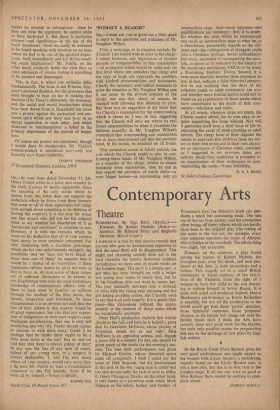'WITHOUT A HEARER?'
must ask you to grant me a little space to reply to the questions and criticisms of Mr. Vaughan Wilkes.
First, a nettoyage de la situation verbale. By 'Church' I do indeed wish to refer to the clergy. I refute, however, any imputation of layman myopia or irresponsibility in this connotation —an accusation which would be valid only on that level where one considers that clergy and the laity at large can approach the problem with kindred preconceptions and techniques. Clearly the necessary and radical measures to solve the situation as Mr. Vaughan Wilkes sees it can never be the private concern of the clergy, nor can they alone, of course, be charged with allowing that situation to arise, But there was no suggestion in my letter that the Church is responsible for the overcrowding which is about us; I was, in fact, suggesting that the Church will only see where its real future responsibilities lie when it abandons the dubious causality in Mr. Vaughan Wilkes's contention that overcrowding and materialism are de facto inter-related and that the problem must, in his words, be attacked on all fronts, This contention seems to falsify entirely the role which the Church ought to play in con- fronting these issues. If Mr. Vaughan Wilkes, as a member of the clergy, wishes to rescue humanity from materialism, then he can at best regard the provision of youth clubs—or even bigger houses—as representing only an intermediate stage. And—more apposite—two qualifications are necessary: first, it is doubt- ful whether the steps which he recommends can reach an intermediate stage to what he, as a churchman, presumably regards as the ulti- mate end—the reintegration of renegade youth into a Christian heritage. Social philanthropy has rarely succeeded in reconquering the apos- tate, as seems to be indicated by the history of the manifestly unreligious YMCA or by many a flourishing Mothers' Union. Second, it is even more doubtful whether these measures do not, in fact, indicate a false historical perspec- tive in not realising that the days of the coherent youth or adult community are over and whether more fruitful tactics could not be based on an exploitation of those media which have contributed to the death of that com- munity—television and radio.
At all events, whatever steps are taken, the Church cannot afford, for its own sake, to re- quire supporting fire from without. Nor will it guarantee itself even a brief lease of life by espousing the cause of town-planning or adult centres. The clergy have at their disposal the means to approach this problem from the out- set on their own terms and in their own charac- ter as purveyors of Christian truth, provided, as I suggested in my previous letter, any activity which they undertake is preceded by an examination of their techniques in com- municating the truth.—Yours faithfully, St. John's College, Cambridge
H. A. J. DEANS










































































 Previous page
Previous page